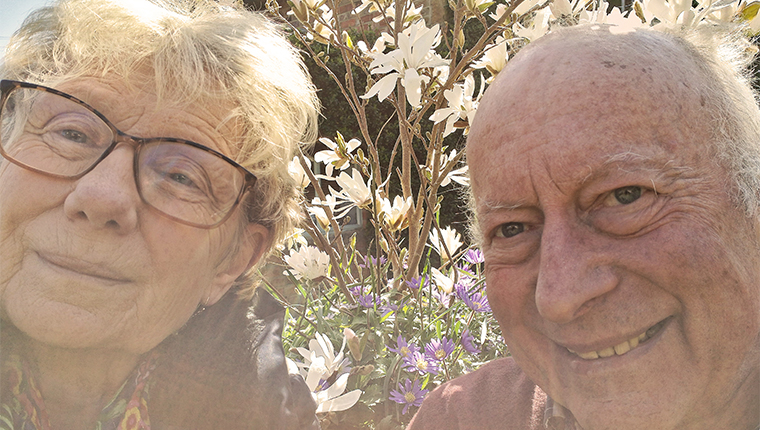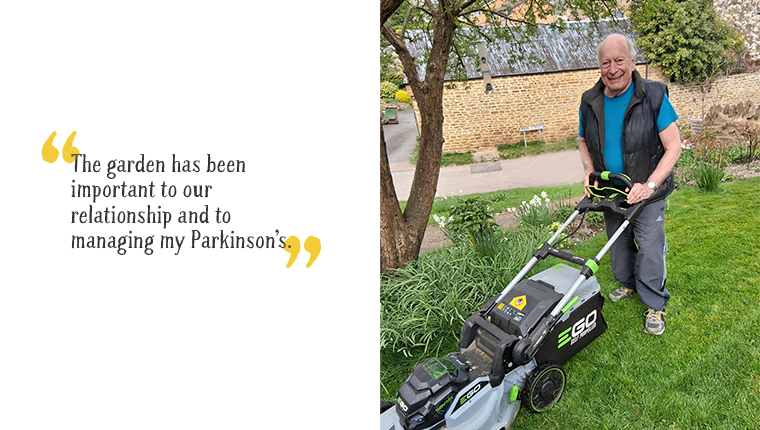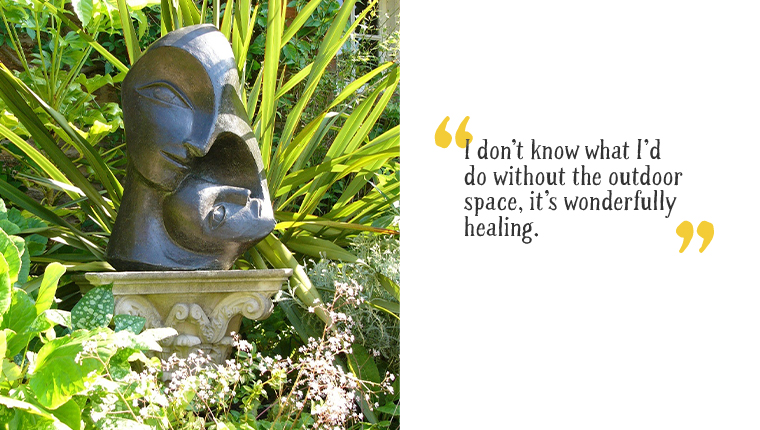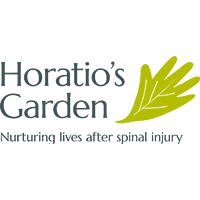Love and Gardens

There is a garden that opens for the National Garden Scheme called Shakespeares Cottage and, as fate would have it, the story of those who live there is by turns tragic and romantic. Tragic in that the owners were both sadly widowed but romantic in that they are teenage sweethearts reunited after fifty years apart.
The story of Pen and Joss was first told by Parkinson’s UK in 2019 as the couple had met through a Parkinson’s UK branch in Oxford.
“When I was widowed my good friend and neighbour invited me to the meetings as a way of getting me out of the house,” explains Pen who became so involved that she was eventually elected Branch Secretary. Joss, meanwhile, who had lost his wife and been diagnosed with Parkinson’s, googled the Oxford branch and was amazed to see Pen listed as a contact.
“Joss was my first love, but when we first met the age gap – I was 16 and he was 19 – felt huge,” says Pen. The Bard himself would have been proud of the plot twist that not only brought these two garden lovers together at Shakespeares Cottage, but also saw them married after half a century apart.
But this is meant to be a story about gardens and how they play an important role in managing Parkinson’s, not about love, and yet it seems that very often it is hard to separate the two.
“The garden has been important to our relationship and to managing my Parkinson’s,” says Joss. “I’ve opened the garden as part of the Badby village group since 2008, firstly with my late wife and since 2019 with Pen.”
“I helped out on the first opening after Joss was widowed and everyone assumed I was linked to the cottage. I told one visitor that I was just a friend and his reply ‘nobody is just a friend’ has stayed with me,” says Pen. “As has the fact that Joss handed me a half-moon edging tool and set me to work on the borders!”
The division of labour, with Joss doing most of the hedging, pruning and lawn mowing and Pen in charge of the planning and planting, works well.
“Fortunately, my symptoms are relatively mild, I have slight tremor and balance issues, but they do not stop me from gardening,” says Joss. “I was told quite early on that the secret to dealing with Parkinson’s is exercise, exercise, exercise. I can’t say I’m squeaky clean in terms of my devotion to the garden, but it does provide something beautiful on my doorstep and gives me the opportunity to get out.”

Add to the garden nearby woods that fill with bluebells in the spring and the enticements of nature seem intent on getting Joss out and exercising. “It’s a little haven of peace, and I value that,” he says.
Joss also does regular Parkinson’s UK prescribed exercises and sees a physiotherapist, all of which helps keep him steady on his feet. And although
ladder climbing and pruning the huge wisteria and climbing roses are now off limits, he finds great joy in the garden, and Pen’s wonderful successional planting which means that every season is full of colour and interest.
“We also grow a lot of our own produce,” adds Pen. “Mainly fruit, apples, pears, rhubarb and we have a fig tree, that despite being on a north facing wall has produced well for many years.”
The fresh fruit and vegetables that are an important part of the Parkinson’s diet also help Pen, a keen compost maker, create three productive compost heaps. “We wrap the food waste in newspaper and it’s great for the compost which is turn is great for the garden.”
Along with physical exercise and diet the therapeutic benefits of gardening are not lost on Pen and Joss who can get so absorbed in the task that they forget to worry about anything else. It also provides relief for Pen from her caring role.

“The garden is hugely important in that respect,” she says. “We both find that being active rather than passive in the garden is the best therapy. It’s not a bed of roses all the time, Joss has good days and bad days – as do I – and I don’t know what I’d do without the outdoor space, it’s wonderfully healing.”
Healing too is the great enjoyment that they both derive from opening the garden to visitors with the National Garden Scheme.
“It’s hugely sociable and lovely hearing other people’s stories and interacting with them,” says Joss.
“And such a thrill selling plants and knowing that the opening contributes to the £350,000 given annually to Parkinson’s UK. We’re very proud of that,” adds Pen. “And very keen to shine a positive light on living with Parkinson’s, something the garden lets us do.”
As with all good tales there is a twist. In this story of love and gardens the cottage is not actually named after the Bard but after Robert and Joyce Shakespeare whose initials are carved above the door with the date 1728. Joss’s research revealed that Joyce’s maiden name was Burbage, and for those in the know, Shakespeare wrote Hamlet for Richard Burbage who in turn, it is said, taught the role to Joseph Taylor, mentioned as a ‘principall actor’ in 1623 and one of Joss’s ancestors.
Watch the video of their Parkinson’s journey supported by the National Garden Scheme and Parkinson’s UK here:
You can visit the garden at Shakespeares Cottage in Northamptonshire when it opens as part of the Badby Gardens group on Sunday 17 May.
For details CLICK HERE
This story was originally published in the 2025 Little Yellow Book of Gardens and Health – to read it click here

















